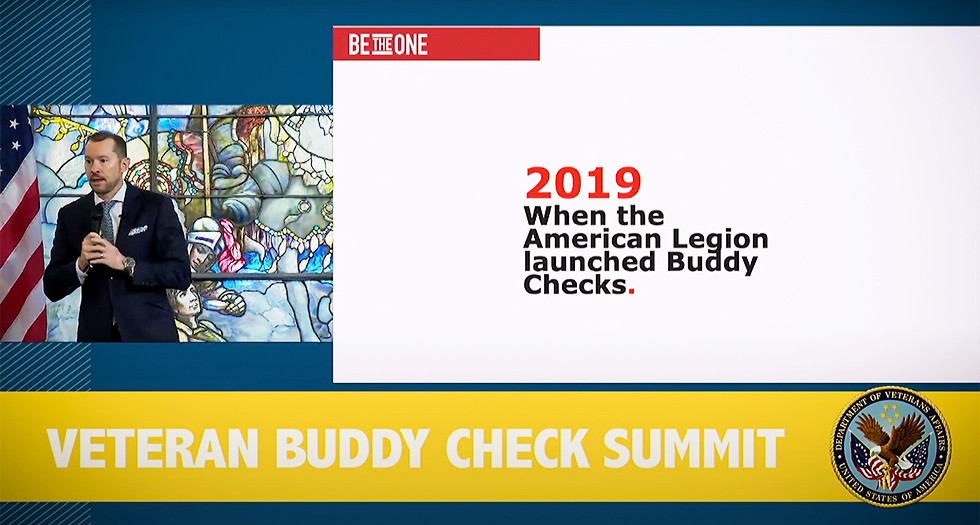VA secretary praises organization for its outreach effort started in 2019 during summit that also provided opportunity to share awareness about Be the One.
An event this week to promote Buddy Checks in general, and National Buddy Check Week specifically, also served as an opportunity to promote The American Legion’s Be the One veteran suicide prevention program.

2019 Be The One
But the U.S. Department of Veterans Affairs (VA) first-ever Veteran Buddy Check Summit also provided an opportunity for the head of the nation’s largest health-care system to laud the Legion for its promotion of the Buddy Check program that has impacted more than 1 million veterans over the past five years.
American Legion Be the One Chairman Waco Hoover was one of the keynote speakers at the summit, which took place Oct. 22 at the American Red Cross National Headquarters in Washington, D.C. Other veterans service organizations also had representatives on hand to participate, joining VA leadership and other federal agencies.
Hoover used his time to give an overview of Be the One, how it parallels Buddy Checks and why The American Legion started its Buddy Check program. But before that, VA Secretary Denis McDonough had praise for the Legion, which advocated for the eventual passage of legislation mandating VA create a Buddy Check Week.
“The Legion was so right to point us to Buddy Checks, which is just an opportunity to carve out time from your day to check in on somebody important to you,” McDonough said during the town hall portion of the summit. “This is a community issue. And there is community everywhere. Let’s make sure that we’re using all of that community … to underscore the wisdom of the Legion’s thinking.
“The Legion’s really the catalyst here. The thinking the Legion catalyzed was to make sure that we’re checking on vets no matter where they are.”
Hoover offered a similar performance during his time on stage. “Social connections are one of the most important things that we can do to save lives,” he said. “So, imagine what we can do with the intention of having a Buddy Check on a regular basis. That’s very much the spirit of why we launched this back in 2019.”
Hoover said the timing of the launch of the Buddy Check program, less than one year ahead of the global pandemic, “at a period of time when everyone needed it most. Since that time, we’ve touched over a million veterans that we’ve reached out to.”
More than 4,500 American Legion posts have been involved in the Buddy Check program. “Those are distribution centers in your community,” said Hoover, who also pointed out how Be the One and Buddy Checks intersect when it comes to assisting veterans who may be in crisis by “getting involved in someone’s business to save their life. It’s worth it. Each and every one of us know that. We’ve all lost friends and family to suicide.”
Hoover shared two numbers with attendants and viewers of the summit’s live stream: 7,000 and 131,000. The former is U.S. combat deaths since 2001; the latter is the number of veterans who’ve taken their own lives over the same period of time.
“Be the One is The American Legion’s No. 1 priority,” Hoover said. “There’s nothing else that’s more important to this organization than dramatically reducing suicide and working across the military community to do so.
“It comes down to being willing to act. To reach out. To Be the One. It is about destigmatization. It’s about changing culture. This is about going upstream and filtering out the number of men and women who ultimately get to the point of crisis.”
Hoover said that since February through the Legion’s partnership with Columbia University, nearly 10,800 American Legion Family members have received Be the One training, which provides the tools for those who want to learn more about interacting and responding with veterans who may be in crisis.
“Over that period of time, we’ve had almost 30 (members) come forward and share that they have attempted suicide at least once,” Hoover said. “That has never happened before. Shifting that conversation, changing that culture, is incredibly important.”
Dr. Matt Miller, executive director of VA’s Suicide Prevention Program, participated in the town hall with McDonough and pointed to data that showed what isolation can do to a veteran’s mental health.
“I think we’ve seen this in new ways manifest throughout COVID in the last four years,” Miller said. “We saw that the highest suicide rates we’ve seen so far were in 2021. That was after the suicide rates went down in 2019, they went down in 2020 within the veteran population. In the first full year of COVID, suicide rates went up. And we saw those suicide rates went up in some populations within veterans that were more isolated, more disconnected, and had their backs against the proverbial wall in more challenging ways.
“So intuitively, and the research does support the intuition, social connection saves lives. When we feel connected, and when we feel we have a purpose and a place, that is like safe. Buddy Check Week, what it does is communicates from one human being to another. You are connected. You have a connection. You do have a purpose, and you do have a place.”
Buddy Checks, to VA Veterans Experience Office Acting Chief Barbara Morton, are “about slowing down and making the time to connect. Making time to let people know that you’re thinking about them: those that served, their families, caregivers and survivors. Sharing resources with them that they need and may not know about.
“I am very inspired by the entire veteran community that takes the time to honor these connections this week and every week. Together, our common purpose and collective commitment can change the lives of veterans and those who support them, one connection and one conversation at a time.”




